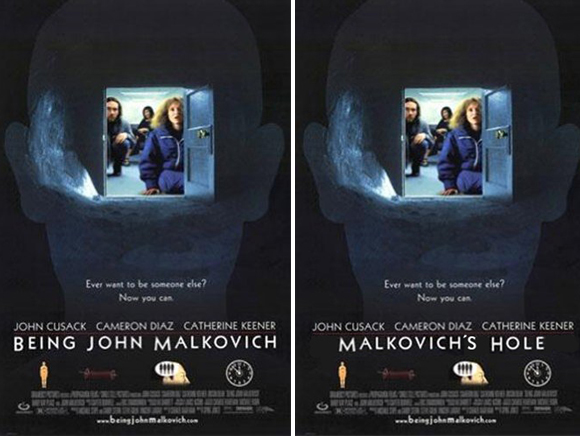
As we’ve seen before, with many international releases the names of films can sometimes be vastly different from the original. The changes are made for a variety of reasons due to language, culture, or style. This begs the question: How much of an impact do these title changes make on the people who see them?
Just for fun, we took 19 movies from other countries that have had their names changed for Japanese audiences, translated them back to English and put them in their original posters.
So join us after the jump for such gems as Academy Award-nominated Nairobi Bees, Love is Deja Vu with Bill Murray, and cult classic Captain Supermarket. What, never heard of them!?
Sometimes the names are changed to be more detailed than the originals. Apparently simple titles like Frozen or Despicable Me raise concerns with filmmakers that potential moviegoers in Japan won’t get hooked. Sometimes it’s helpful to let people know that Frozen, for example, was largely influenced Hans Christian Andersen’s The Snow Queen.
アナと雪の女王 (Frozen)

In the case of other animated works, giving a little more of the plot was in order. After all, titles like “Despicable Me” don’t really tell audiences an awful lot…
怪盗グルーの月泥棒 (Despicable Me)

マルコヴィッチの穴 (Being John Malkovich)

レミーのおいしいレストラン (Ratatouille)
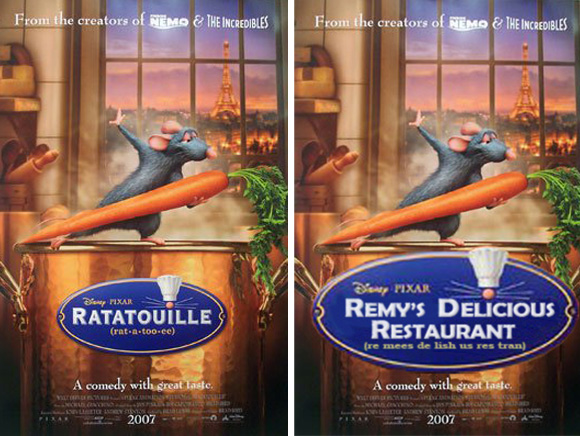
Original mage: Amazon
カールじいさんの空飛ぶ家 (Up)

As you can see, when doing this the titles can get rather lengthy. But that doesn’t stop those in charge from adding in as many extra details as possible. Check out these wonderfully verbose efforts!
素敵な相棒 フランクじいさんとロボットヘルパー (Robot & Frank)

Original image: Amazon
It’s almost as if some movie posters had left the extra negative space ready for just such an occasion.
Original image: Amazon
Of all these, The Butler got the rawest deal. As if poor Cecil hadn’t had a rough enough life, now the Japanese title makes him out to be some kind of cry baby.
大統領の執事の涙 (The Butler)
Original image: Amazon
And then there’s the title for the cult classic Army of Darkness which has quite a couple flaws. For starters, this title gives away the funny little surprise twist at the end of the movie. Also, I don’t think S Mart was a supermarket per se considering he bought his boomstick there.
キャプテン・スーパーマーケット (Army of Darkness)
Original image: Amazon
However, the awesome Japanese poster more than makes up for this. The cans of Bruce Campbell Soup that Ash is standing on are a particularly nice touch.
Original image: Aazon
The rest of the Evil Dead series is given an arguably better title in Japanese.
死霊のはらわたII (Evil Dead II)

Speaking of title improvements, I was always bothered by the name Apocalypse Now. Supposedly inspired from a hippie button that read “Nirvana Now” it sounds clunky and dated these days. Apparently someone connected to the Japanese release agreed, but I’m not really sure what this title is supposed to mean either. Is it supposed to be the apocalypse made by hell or the apocalypse in hell?
地獄の黙示録 (Apocalypse Now)

The first Final Destination movie in Japan kept the same title as its Western release, but for the many sequels to follow someone involved realized there were no more planes in the sequels and thus changed the name accordingly: by naming the main thing the staring teens avoided dying in with the prefix “dead.” A simple, yet surprisingly effective formula.
ファイナル・デッドコースター (Final Destination 3)
Original image: Amazon
Perhaps the worst title of all is The Constant Gardener. I haven’t seen it because the name is just begging me to avoid it. However, reading through the synopsis it does sound pretty good. I understand that the name probably has some significance, but from a marketing standpoint it hardly hooks the casual movie-goer into checking it out. The Japanese title however, promises much more in the way of thrills and danger.
ナイロビの蜂 (The Constant Gardener)
Original image: Amazon
Probably the most popular reason to change a movie title is because of linguistic and cultural differences. Something that can be summed up in a few words like an English or Chinese idiom would take a lot more explaining in another language. Probably best to just flat out change it in that case…
Original image: Amazon
グリーン・デスティニー (Crouching Tiger, Hidden Dragon)
<Original image: Amazon
ショーシャンクの空に (The Shawshank Redemption)
Original image: Amazon
I come from the North-East part of North America and I still have trouble grasping the annual ritual of Groundhog Day. It’s certainly best to avoid that title altogether in Japan.
Original image: Amazon
I guess there’s no Miss Congeniality in Japanese beauty pageants, otherwise they wouldn’t have changed it to Dangerous Beauty. Oddly enough, Dangerous Beauty is also the name of a period drama that came out a couple years before the Sandra Bullock film. The name just happened to be free because the name Dangerous Beauty in Japan was changed to Courtesan Veronica (娼婦ベロニカ). Honestly I’m surprised this kind of mix-up doesn’t happen more often.
デンジャラス・ビューティー (Miss Congeniality)
Original image: Amazon
Finally, we’ll leave you with this… for which we have no explanation. However, it appears it took the combined acting talents of George Clooney and Jeff Bridges to pull off the challenging role of “A Wall.”
ヤギと男と男と壁と (The Men Who Stare at Goats)
Original image: Amazon
Movie shelves all over the country have renamed works all funny, inexplicable, improved, or more succinct. Let us know any that you’ve come across and maybe we can retranslate it and mock it up in a poster at a future date.
Images edited by RocketNews24

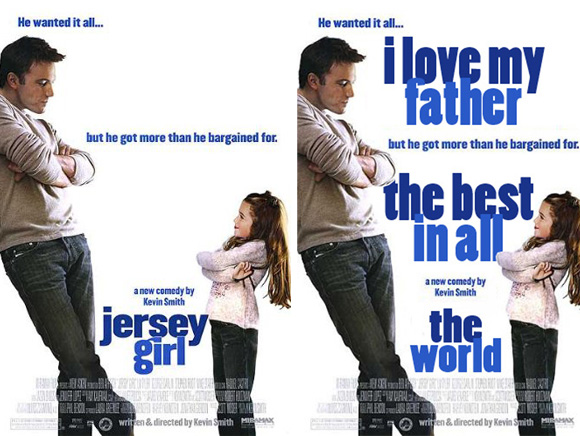


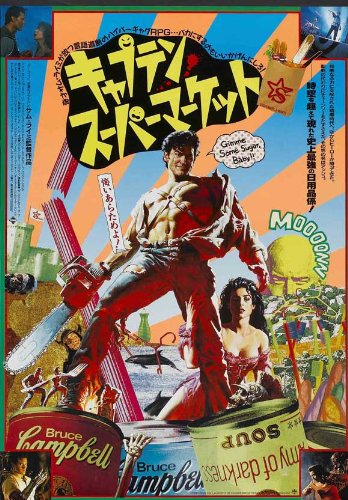

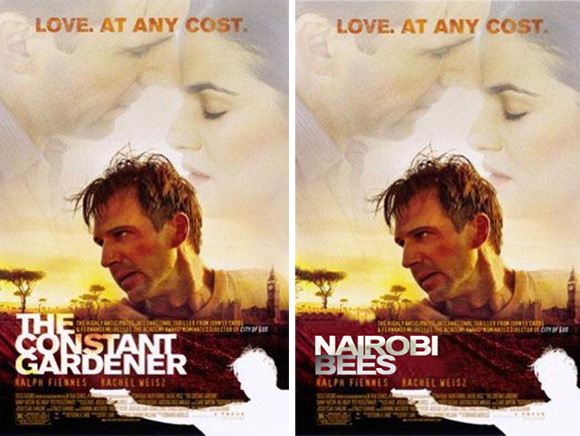






 13 surprising Japanese translations of American movie titles
13 surprising Japanese translations of American movie titles Singing Love Songs to Angels? No Tomorrow for Us? More movies that got weird Japanese titles
Singing Love Songs to Angels? No Tomorrow for Us? More movies that got weird Japanese titles 20th Century Fox to officially apologize for Napoleon Dynamite’s crappy Japanese title
20th Century Fox to officially apologize for Napoleon Dynamite’s crappy Japanese title More adventures in localization: Icelandic film’s poster gets unusual makeover in Japan
More adventures in localization: Icelandic film’s poster gets unusual makeover in Japan “This is a movie” among 10 of Japan’s lamest movie taglines
“This is a movie” among 10 of Japan’s lamest movie taglines Man arrested in Japan after leaving car in coin parking lot for six years, racking up three-million-yen bill
Man arrested in Japan after leaving car in coin parking lot for six years, racking up three-million-yen bill New Family Mart cinema opens inside Japanese airport
New Family Mart cinema opens inside Japanese airport A look back on 40 years of Japanese schools banning stuff
A look back on 40 years of Japanese schools banning stuff Swapping seats on Japan’s bullet trains is not allowed, Shinkansen operator says
Swapping seats on Japan’s bullet trains is not allowed, Shinkansen operator says Japan’s first all-matcha ramen restaurant is now open in Kyoto【Photos】
Japan’s first all-matcha ramen restaurant is now open in Kyoto【Photos】 Lawson convenience stores sell a mega katsu sando, and there’s a hack to get it cheap in Japan
Lawson convenience stores sell a mega katsu sando, and there’s a hack to get it cheap in Japan New Japanese convenience store sandwiches feel like they’re out to kill us
New Japanese convenience store sandwiches feel like they’re out to kill us Famous Japanese painter’s centuries-old cat artwork proves Japan has always loved felines
Famous Japanese painter’s centuries-old cat artwork proves Japan has always loved felines Japan’s Self-Defense Forces take “radio calisthenics” to an interesting new level
Japan’s Self-Defense Forces take “radio calisthenics” to an interesting new level How to properly eat a traditional Japanese tonkatsu meal
How to properly eat a traditional Japanese tonkatsu meal Is China’s don’t-go-to-Japan warning affecting the lines at a popular Tokyo gyukatsu restaurant?
Is China’s don’t-go-to-Japan warning affecting the lines at a popular Tokyo gyukatsu restaurant? Three beautiful places to see Japan’s plum blossoms after starting your day in downtown Tokyo
Three beautiful places to see Japan’s plum blossoms after starting your day in downtown Tokyo Cherry blossom forecasts map shows Japan’s OTHER sakura season is starting right now
Cherry blossom forecasts map shows Japan’s OTHER sakura season is starting right now Downloads of 39-year-old Guns N’ Roses song increase 12,166 percent thanks to Gundam
Downloads of 39-year-old Guns N’ Roses song increase 12,166 percent thanks to Gundam Huge Evangelion Unit-01 head appearing in lights in Japan to celebrate anime’s 30th anniversary
Huge Evangelion Unit-01 head appearing in lights in Japan to celebrate anime’s 30th anniversary Take a trip to Japan’s Dododo Land, the most irritating place on Earth
Take a trip to Japan’s Dododo Land, the most irritating place on Earth New Studio Ghibli stamps leave an impression on your stationery…and your heart
New Studio Ghibli stamps leave an impression on your stationery…and your heart Family Mart releases huge range of cute sweets for Cat Day in Japan
Family Mart releases huge range of cute sweets for Cat Day in Japan Japan’s most famous Mt. Fuji view park cancels cherry blossom festival because of overtourism
Japan’s most famous Mt. Fuji view park cancels cherry blossom festival because of overtourism Starbucks Japan releases new drinkware and goods for Valentine’s Day
Starbucks Japan releases new drinkware and goods for Valentine’s Day Japan releases first official sakura cherry blossom forecast for 2026
Japan releases first official sakura cherry blossom forecast for 2026 Archfiend Hello Kitty appears as Sanrio launches new team-up with Yu-Gi-Oh【Pics】
Archfiend Hello Kitty appears as Sanrio launches new team-up with Yu-Gi-Oh【Pics】 China’s don’t-go-to-Japan warning looks to be affecting tourist crowds on Miyajima
China’s don’t-go-to-Japan warning looks to be affecting tourist crowds on Miyajima Starbucks Japan releases new Frappuccino and latte for Valentine’s Day
Starbucks Japan releases new Frappuccino and latte for Valentine’s Day Studio Ghibli releases new “komorebi” plush toys from Princess Mononoke and Spirited Away
Studio Ghibli releases new “komorebi” plush toys from Princess Mononoke and Spirited Away Yokai are descending upon Tokyo this spring in the latest immersive art experience
Yokai are descending upon Tokyo this spring in the latest immersive art experience Japan’s Naruto theme park now offering real-world version of Minato’s kunai ninja weapon
Japan’s Naruto theme park now offering real-world version of Minato’s kunai ninja weapon Our 52-year-old pole dancing reporter shares his tips for achieving your New Year’s exercise goal
Our 52-year-old pole dancing reporter shares his tips for achieving your New Year’s exercise goal Survey asks foreign tourists what bothered them in Japan, more than half gave same answer
Survey asks foreign tourists what bothered them in Japan, more than half gave same answer Japan’s human washing machines will go on sale to general public, demos to be held in Tokyo
Japan’s human washing machines will go on sale to general public, demos to be held in Tokyo We deeply regret going into this tunnel on our walk in the mountains of Japan
We deeply regret going into this tunnel on our walk in the mountains of Japan Studio Ghibli releases Kodama forest spirits from Princess Mononoke to light up your home
Studio Ghibli releases Kodama forest spirits from Princess Mononoke to light up your home Major Japanese hotel chain says reservations via overseas booking sites may not be valid
Major Japanese hotel chain says reservations via overseas booking sites may not be valid Put sesame oil in your coffee? Japanese maker says it’s the best way to start your day【Taste test】
Put sesame oil in your coffee? Japanese maker says it’s the best way to start your day【Taste test】 No more using real katana for tourism activities, Japan’s National Police Agency says
No more using real katana for tourism activities, Japan’s National Police Agency says Starbucks Japan reveals new sakura drinkware collection, inspired by evening cherry blossoms
Starbucks Japan reveals new sakura drinkware collection, inspired by evening cherry blossoms Updated cherry blossom forecast shows extra-long sakura season for Japan this year
Updated cherry blossom forecast shows extra-long sakura season for Japan this year Burger King roasts McDonald’s with cryptic message on poster jabbing huge new store in Akihabara
Burger King roasts McDonald’s with cryptic message on poster jabbing huge new store in Akihabara Creative drawings to reply to wedding invites are all the rage in Japan right now 【Photos】
Creative drawings to reply to wedding invites are all the rage in Japan right now 【Photos】 18 Japanese words understood around the world
18 Japanese words understood around the world Avengers film’s Japan scenes look just like the real Japan…if you haven’t spent much time there
Avengers film’s Japan scenes look just like the real Japan…if you haven’t spent much time there Studio Ghibli answers Spirited Away fan questions, reveals exciting facts and trivia behind the film
Studio Ghibli answers Spirited Away fan questions, reveals exciting facts and trivia behind the film
Leave a Reply